I could have ended this post at the title. That really is the point. I have been writing fiction for close to thirty years. I have finished more than thirty novels and as many pieces of short fiction, and yes, each time I complete the first draft of any story, it feels great. Kind of like completing a good workout or reaching the summit on a lengthy hike.
So, what is this new, just-completed novel about?
Well, I can’t really tell you that. I am co-writing with someone — a person of some celebrity who came up with the story concept but left much of the writing to me. Someone who, I will be honest, paid me rather well. And someone who, for now, would rather I said less than more about the story, the book, and our partnership.
I’m fine with that, but it does mean that I can’t answer questions. I’m sorry to keep secrets. Really.
I can tell you that finishing this particular book has felt better than most. In part, that is a consequence of all that my family and I have been through. I finished a novella for Joshua Palmatier at Zombies Need Brains earlier this year, and I’m pleased with how that came out. But this more recent project felt big when I started it. I didn’t know if I was up for writing a full novel.
And it is always a challenge to write in someone else’s world, bringing to life someone else’s characters and plot lines. (As it happens, the Zombie Need Brains story was written in a shared universe, so both of the things I’ve worked on this year have been not entirely my own.) On the one hand, when writing in someone else’s sandbox, I want to honor the creative vision of the person or people who conceived of the world and characters. I feel a sense of responsibility to the original idea and source material (in this case, a script). At the same time, though, I also NEED to feel some ownership in the project. I want to have a creative stake in what I’m writing. Otherwise, the work has no emotional or artistic appeal, and my writing winds up sounding flat.
As many of you know, about fifteen years ago, I wrote the novelization of a script for a major motion picture (I would rather not be more specific . . .). It was a difficult and, frankly, unpleasant process, in large part because I was given no freedom to create. I had to stick to the exact dialogue and narrative presented in the script. I could do some internal monologue, but that was all. This new project was VERY different. My co-writer gave me a good deal of freedom to write the story as I thought it should be written. As this person pointed, movies and their books are often very different. They were fine with that being the case here.
As a result, the book proved to be a great way for me to work my way back into writing after last year. A good deal of the emotional content was already spelled out in the original source material, meaning I didn’t have to do a deep dive into my own emotional world, which I am not yet ready to do. But I could add in some new content, some different characters, some different points of view. And in so doing, I could put my own creative stamp on the finished product. Which I did, quite well, I believe. The resulting story really is a collaboration, a blending of artistic visions.
What’s next for me professionally?
I’m not sure yet. Nancy and I have some travel planned for this year, as well as some long-deferred work on the house and yard. And so I think I will probably take a little break from writing fiction while we tend to other parts of our lives. But that is not to say I don’t have ideas for new stories. I do. I have Thieftaker ideas, I have an old series that I still intend to reissue sometime fairly soon, I even have Fearsson ideas. And I have ideas for stories in universes not-yet-created-or-explored. So, stay tuned.
And thank you for your patience.
Have a great week.









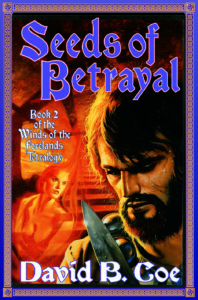 I have spoken before about the recurring problem I have with manuscripts at about the 60% mark. For those unfamiliar with the phenomenon, which afflicts many writers — not just me — it is fairly simple to explain. When I write a novel, I tend to make fairly steady progress until I approach the final third of the narrative. At that point, I run into a wall. And this has been true from the very start of my career. I didn’t recognize the pattern until one afternoon, while working on my fourth or fifth book. I came downstairs after a frustrating day, and Nancy asked me how my novel was coming.
I have spoken before about the recurring problem I have with manuscripts at about the 60% mark. For those unfamiliar with the phenomenon, which afflicts many writers — not just me — it is fairly simple to explain. When I write a novel, I tend to make fairly steady progress until I approach the final third of the narrative. At that point, I run into a wall. And this has been true from the very start of my career. I didn’t recognize the pattern until one afternoon, while working on my fourth or fifth book. I came downstairs after a frustrating day, and Nancy asked me how my novel was coming.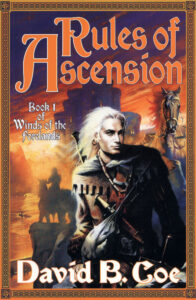 Trust your reader.
Trust your reader. And because we work so hard on all this stuff (and other narrative elements I haven’t even mentioned) we want to be absolutely certain that our readers get it all. We don’t want them to miss a thing, because then all our Great Work will be for naught. Because maybe, just maybe, if they don’t get it all, then our Wonderful Plot might not come across as quite so wonderful, and our Deep Characters might not come across as quite so deep, and our Spectacular Worlds might not feel quite so spectacular.
And because we work so hard on all this stuff (and other narrative elements I haven’t even mentioned) we want to be absolutely certain that our readers get it all. We don’t want them to miss a thing, because then all our Great Work will be for naught. Because maybe, just maybe, if they don’t get it all, then our Wonderful Plot might not come across as quite so wonderful, and our Deep Characters might not come across as quite so deep, and our Spectacular Worlds might not feel quite so spectacular.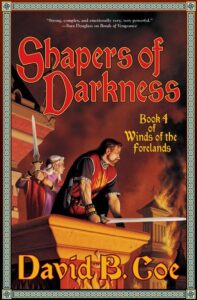 Okay, yes, I’m making light, poking fun at myself and my fellow writers. But fears such as these really do lie at the heart of most “trust your reader” moments. And so we fill our stories with unnecessary explanations, with redundancies that are intended to remind, but that wind up serving no purpose, with statements of the obvious and the already-known that serve only to clutter our prose and our storytelling.
Okay, yes, I’m making light, poking fun at myself and my fellow writers. But fears such as these really do lie at the heart of most “trust your reader” moments. And so we fill our stories with unnecessary explanations, with redundancies that are intended to remind, but that wind up serving no purpose, with statements of the obvious and the already-known that serve only to clutter our prose and our storytelling.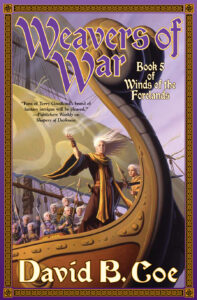 As a result, the first volume of the series was originally 220,000 words long. Yes, that’s right. Book II was about 215,000, and the later volumes were each about 160,000. They are big freakin’ books. Now, to be clear, there are other things that make them too wordy, and I’m fixing those as well. And the fact is, these are big stories and even after I have edited them, the first book will still weigh in at well over 200,000 words. My point is, they are longer than they need to be. They are cluttered with stuff my readers don’t need, and all that stuff gets in the way of the many, many good things I have done with my characters and setting and plot and prose.
As a result, the first volume of the series was originally 220,000 words long. Yes, that’s right. Book II was about 215,000, and the later volumes were each about 160,000. They are big freakin’ books. Now, to be clear, there are other things that make them too wordy, and I’m fixing those as well. And the fact is, these are big stories and even after I have edited them, the first book will still weigh in at well over 200,000 words. My point is, they are longer than they need to be. They are cluttered with stuff my readers don’t need, and all that stuff gets in the way of the many, many good things I have done with my characters and setting and plot and prose.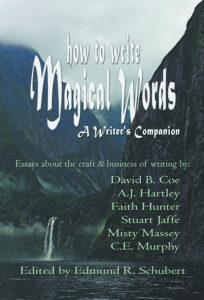 We kept the site going for nearly a decade (thanks Todd Massey), and the site still exists, for those interested in wading through the extensive archives. We also produced a writing book, which is still available.
We kept the site going for nearly a decade (thanks Todd Massey), and the site still exists, for those interested in wading through the extensive archives. We also produced a writing book, which is still available. Very early in my career — like, one book in — I attended a very large convention as a guest. It was by far the largest, best-attended con I’d been, too, and at first I was a bit star-struck by the whole thing. Unfortunately, that didn’t last. Read on.
Very early in my career — like, one book in — I attended a very large convention as a guest. It was by far the largest, best-attended con I’d been, too, and at first I was a bit star-struck by the whole thing. Unfortunately, that didn’t last. Read on.